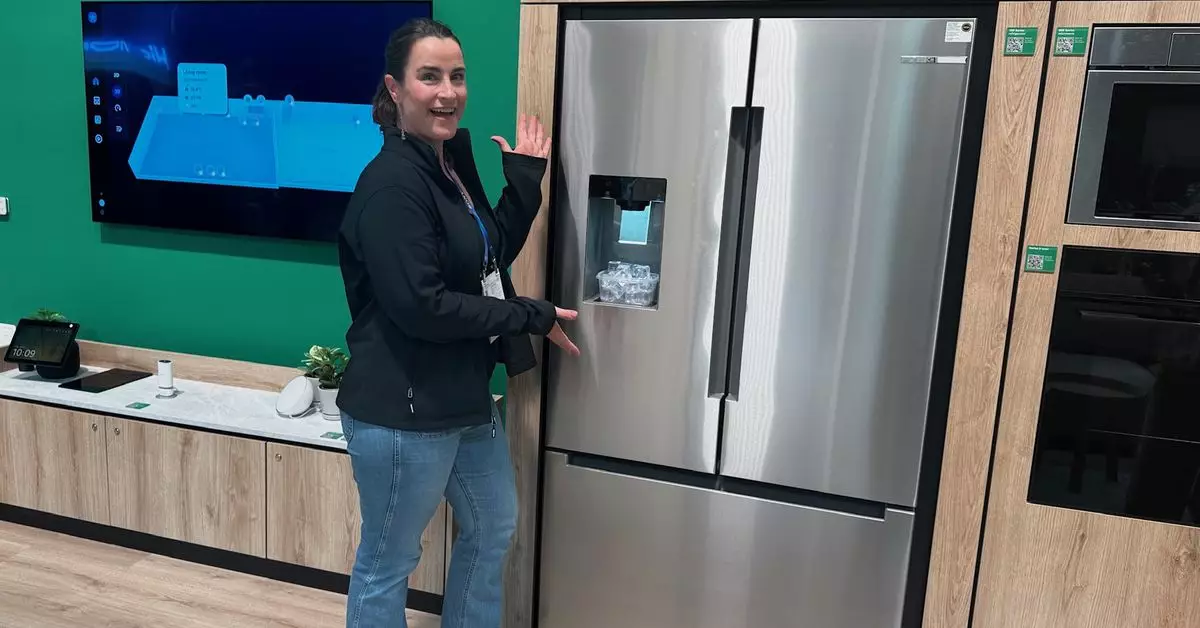As the smart home technology landscape evolves, one significant leap forward has been the advent of the Matter standard—an interoperable connectivity protocol that enables diverse smart devices to communicate seamlessly. At the forefront of this innovation is Bosch, a household name in appliance manufacturing. The company recently showcased its 100 Series French Door Bottom Mount Refrigerator at CES, marking its foray into Matter-enabled appliances. Priced at $2,500, this model, which launched in November, is poised to hit the U.S. market by spring, bringing a world of connected convenience to discerning consumers.
The standout feature of the 100 Series is its built-in support for the Matter protocol, a move that will allow users to remotely adjust temperature settings and receive alerts via their preferred smart home ecosystem. Eelco Lammertink from BSH, the parent company of Bosch, explains that this will enable users to integrate their refrigerator into a broader smart home environment—an increasingly crucial aspect as homes become more digitally connected.
The refrigerator’s functionality aligns it with contemporary smart home trends, where automation and user alerts play a pivotal role. For example, if a user accidentally leaves the fridge door ajar, their smart speaker could announce the oversight, thus preventing food spoilage. This local communication enabled by Matter is a game changer, enhancing speed and security compared to existing embedded systems reliant on cloud services.
While the 100 Series represents Bosch’s entry into the Matter ecosystem, it’s essential to recognize the potential ripple effects of this technology across the appliance market. Matter aims to unify various platforms like Amazon Alexa, Google Home, and Apple Home, promising a universal connectivity landscape for smart appliances. Currently, only a few platforms, including Samsung SmartThings and Home Assistant, have established support for Matter appliances, but Amazon’s anticipated inclusion this year suggests an expanding reach.
Moreover, Lammertink revealed plans to enhance the refrigerator with energy management features, allowing it to take part in a Matter-enabled whole home energy management system. This development represents a significant advance towards sustainability, reflecting growing consumer interest in energy-efficient devices. By integrating appliances into a comprehensive energy monitoring system, households can gain insights into their consumption patterns, ultimately paving the way for more responsible energy usage.
Despite these advancements, not all news is favorable. Lammertink noted that existing Bosch appliances, including brands like Thermador, won’t receive firmware updates to integrate Matter capabilities. He identifies the risks of “bricking” these older models as a significant challenge, a concern echoed by many consumers who might feel left out of the smart home revolution. This limitation serves as a reminder that while new products may embrace the latest technologies, the older appliances in our homes may remain stranded in less efficient ecosystems.
As we look ahead, the full realization of Matter’s potential depends on widespread adoption beyond Bosch. The protocol’s open-source nature lays the groundwork for various manufacturers to create compatible devices. By facilitating communication over diverse networks—whether Wi-Fi, Ethernet, or low-power mesh networking—it democratizes smart home integration.
With major corporations rallying behind Matter, including tech titans like Apple, Amazon, Google, and Samsung, the smart home of the future could very well become a hub of efficiency and convenience, minimizing compatibility issues that have long plagued consumers. As more devices carry the Matter logo, users will find simplified setups and the ability to control devices from multiple platforms seamlessly.
Bosch’s introduction of the 100 Series refrigerator exemplifies a pivotal turning point in the landscape of smart home technology. By aligning with Matter, Bosch not only enhances the functionality of its appliances but also leaves the door wide open for advancements in energy management and cross-device communication. As the future unfolds, these innovations will redefine our interactions with home appliances, making life simpler, more efficient, and more sustainable. Ultimately, embracing the Matter protocol is about more than just connectivity; it’s about crafting smarter, more responsive homes for everyone.

